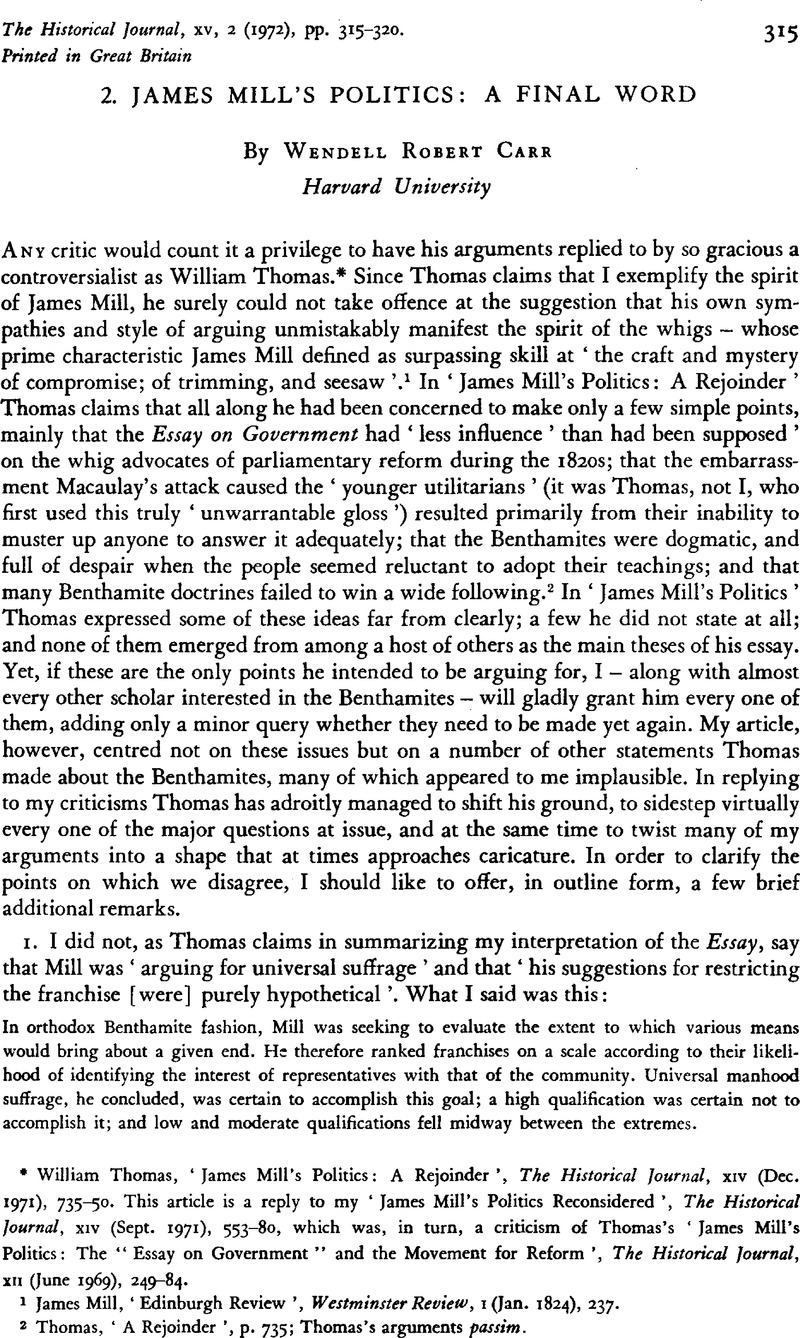Article contents
2. James Mill's Politics: A Final Word
Published online by Cambridge University Press: 11 February 2009
Abstract

- Type
- Communications
- Information
- Copyright
- Copyright © Cambridge University Press 1972
References
* Thomas, William, ‘James Mill's Politics: A Rejoinder’, The Historical Journal, xiv (12.1971), 735–50CrossRefGoogle Scholar. This article is a reply to my ‘ James Mill's Politics Reconsidered ’, The Historical Journal, xiv (09. 1971), 553–80Google Scholar, which was, in turn, a criticism of Thomas, 's ‘ James Mill's Politics: The “Essay on Government” and the Movement for Reform ’, The Historical Journal, XII (06 1969), 249–84.CrossRefGoogle Scholar
1 Mill, James, ‘ Edinburgh Review’, Westminster Review, 1 (01 1824), 237.Google Scholar
2 Thomas, , ‘ A Rejoinder ’, p. 735; Thomas's arguments passim.Google Scholar
3 Thomas, , ‘ A Rejoinder ’, p. 735Google Scholar; Carr, , ‘ James Mill's Politics Reconsidered ’, pp. 556–7Google Scholar; Mill, James, ‘Essay on Government’, in Essays on Government, Jurisprudence, Liberty of the Press, and the Law of Nations (London, n.d.), p. 3Google Scholar. For the attitude of the Benthamites to the Reform Bill of 1832, see Carr, , ‘ James Mill's Politics Reconsidered ’, pp. 578–80.Google Scholar
4 Thomas, , ‘ A Rejoinder ’, p. 737Google Scholar; Stillinger, J. (ed.), The Early Draft of John Stuart Mill's Autobiography (Urbana, 1961), pp. 98 and 98–9.Google Scholar
5 Carr, , ‘ James Mill's Politics Reconsidered ’, pp. 560, 557Google Scholar; Thomas, , ‘ A Rejoinder’, p. 740Google Scholar; Hobhouse, 's statements quoted in An Authentic Narrative of the Events of the Westminster Election (London, 1819), p. 78Google Scholar. Thomas quotes Hobhouse's remark that the extension of the suffrage was of ‘ third-rate importance ’. He would have illuminated the meaning of this statement had he told us that by ‘ third-rate importance ’ Hobhouse meant third in importance to attaining equality of the right of suffrage and an equal number of electors within each constituency (Authentic Narrative, p. 78). Thomas would, in addition, have given a more balanced view of Hobhouse's position on the suffrage had he told us that immediately preceding the passage he quoted, Hobhouse had said this: ‘ The Society [the Friends of the People in the 1790s] declared for equality and impartiality of suffrage, and for a new division of the country; Mr. Hobhouse declared for equality and uniformity of suffrage, implying, of course, a new division of the country. The Society said, the electors should be as numerous as possible; Mr. Hobhouse declared for the largest extension of suffrage possible. The Society declared that the elections might be triennial, biennial, or even ANNUAL, as they were in former times. Mr. Hobhouse declared that elections might be every twenty-four months, or every twelve months ’. (This last sentence casts some doubt on Thomas's statement in ‘ A Rejoinder ’ that on shorter Parliaments Hobhouse was ‘ equivocal ’.) Hobhouse, John Cam, Defense of the People in Reply to Lord Erskine (London, 1819), pp. 62–3. I do not, of course, intend to imply that Hobhouse and Mill agreed on every particular. I mean merely to point out how the thought of each left room for compromise on details.Google Scholar
6 Mill, James, ‘ Edinburgh Review on Parliamentary Reform’, Westminster Review, iv (07 1825), 220.Google Scholar
7 Carr, , ‘James Mill's Politics Reconsidered ’, p. 562Google Scholar; Thomas, , ‘ A Rejoinder ’, p. 735Google Scholar.
8 Thomas, , ‘ A Rejoinder ’, pp. 745–7Google Scholar; Carr, , ‘ James Mill's Politics Reconsidered ’, pp. 566 and 568–9.Google Scholar
9 Thomas, , ‘ A Rejoinder ’, p. 738Google Scholar; Thomas, , ‘James Mill's Politics ’, p. 262Google Scholar. Carr, , ‘ James Mill's Politics Reconsidered ’, pp. 565–6Google Scholar. Thomas's remarks on my discussion of John Mill's views on Ireland also miss the point at issue. To my statement that John Mill did not mean his approval of disfranchizing the forty-shilling freeholders in Ireland to apply to England, Thomas replies: ‘ Why not? Did not Ireland send members to the Parliament at Westminster? Were not some of the landowners whom Mill thought likely to be injured by disfranchisement, members of the House of Lords? Did not proposals for Catholic relief excite English crowds at “ No Popery ” meetings? ’ (‘ A Rejoinder ’, p. 749). Though, of course, correct, these facts have little bearing on the simple truth that John Mill advocated disfranchisement of the forty-shilling freeholders in Ireland and extension of the franchise in England. And whatever the influence of the History of British India on administrators who denied India a claim to ‘ special treatment ’ (‘ A Rejoinder ’, p. 749), the fact remains that the logic of James Mill's thought by no means demanded that the Benthamites advocate identical policies for all nations and all historical epochs. The evidence? James Mill's own words in the History of British India, which I quoted in ‘ James Mill's Politics Reconsidered ’, p. 572.
10 Thomas, , ‘ A Rejoinder ’, p. 745Google Scholar; Carr, , ‘ James Mill's Politics Reconsidered ’, p. 580 and passim.Google Scholar
11 Thomas, , ‘ A Rejoinder ’, p. 750. Thomas's arguments passim.Google Scholar
- 1
- Cited by


